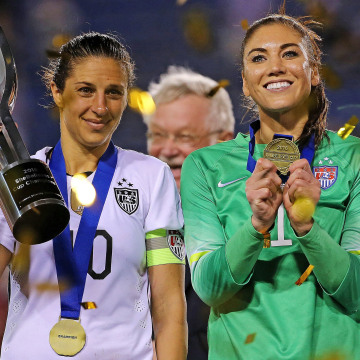The world champion U.S. women’s national soccer team asked a federal judge on Thursday to clear the way for it to strike over alleged pay inequities just two months before the start of the Summer Olympic Games.
U.S. District Judge Sharon Johnson Coleman, who heard arguments in Chicago from lawyers for the players’ union and for the U.S. Soccer Federation (USSF), didn’t say when she might rule, The Associated Press reported.
The hearing came on the same day that the U.S. Senate passed by voice vote a non-binding resolution calling on the USSF to “immediately end gender pay inequity and to treat all athletes with the respect and dignity those athletes deserve.”


The USSF claims that members of the team implicitly promised not to strike in a 2013 agreement. Lawyers for the union say any such pledge, if it existed, wasn’t in writing and can’t be enforced.
“If this case continues, if the dispute continues, then there is a probability that the greatest women’s soccer team in the world will not be participating in the Olympics,” which open in Rio de Janeiro on Aug. 5, Lester Munson, a legal affairs writer for ESPN, told NBC Chicago.
Richard Nichols, the union’s executive director, told reporters after the hearing that he’s eager to resolve the dispute before it comes to that. But “we’re going to reserve our rights to do whatever we need to do to affect equal pay,” he said.
Five top U.S. players — World Cup hero Carli Lloyd, Hope Solo, Alex Morgan, Becky Sauerbrunn and Megan Rapinoe — filed a complaint with the U.S. Equal Employment Opportunity Commission in March alleging that members of the women’s national team are paid significantly less than members of the men’s national team are.
U.S. women are paid $3,600 to $4,950 per appearance for their national team, while men receive $6,250 to $17,625, according to the complaint.
Women make 44 percent of what the men earn for making the World Cup team, it says.
That’s even though the #1 ranked women’s team — winners of the 2015 World Cup and two others — has historically been far more successful than the men, who have never beyond the World Cup quarterfinals since 1930, and are currently ranked at #29.
“We’ve proven our worth over the years,” Lloyd, whose three goals in the final last year secured the United States’ World Cup championship, said on NBC’s TODAY in March.
“The pay disparity between men and women is just too large,” Lloyd said. “We want to continue to fight. The generation of players before us fought, and now it’s our job to keep on fighting.”



